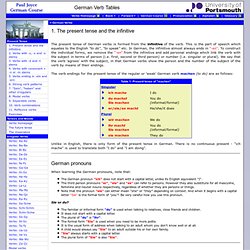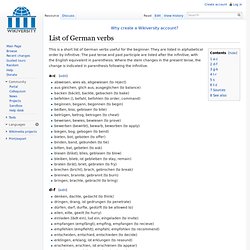

German Verbs With Inseparable Prefixes — Nicht trennbare Verben. Verbs, they seem to be one of the trickiest types of words to learn because there are so many of them and every sentence needs them.

They also often have multiple meanings that change when put together with prepositions and in German when they have separable prefixes. I’ve already written about verbs with separable prefixes before and you’ve surely encountered them already, verbs like: ausmachen, aufstehen, ausgehen etc. But what about those verbs with inseparable prefixes? What do they do? Let’s take a look. Verbs with inseparable prefixes the following prefixes are inseparable. Unlike with the separable prefixes the meaning of these verbs can rarely if ever be deduced from the stem verb. be- (25%) z.B. bestehen (to pass/ to exist / to persist) Ich bestehe. Ich werde bestehen. Ich habe die Prüfung bestanden. A few other common be- verbs: bedienen, befragen, begrüssen, bedanken, bekommen, beschenken, belügen What does the prefix be- do to a verb?
Ent- (15%) Ich entkomme der Polizei. er- (10%) ge- Deutsche Verben - Konjugation - Verbtabellen. German Verb Tables. 1.

The present tense and the infinitive The present tense of German verbs is formed from the infinitive of the verb. This is the part of speech which equates to the English "to do", "to speak" etc. In German, the infinitive almost always ends in "-en". To construct the individual forms, we remove the "-en" from the infinitive and add personal endings which link the verb with the subject in terms of person (i.e. first, second or third person) or number (i.e. singular or plural). The verb endings for the present tense of the regular or 'weak' German verb machen (to do) are as follows: Unlike in English, there is only form of the present tense in German. German pronouns When learning the German pronouns, note that: The German pronoun "ich" does not start with a capital letter, unlike its English equivalent "I".
Sie or du? The familiar or informal form "du" is used when talking to relatives, close friends and children. Verbs with a stem ending in -ieren. German Verbs "Language simple" Print › German verbs (A1) 2. List of German verbs. This is a short list of German verbs useful for the beginner.

They are listed in alphabetical order by infinitive. The past tense and past participle are listed after the infinitive, with the English equivalent in parenthesis. Where the stem changes in the present tense, the change is indicated in parenthesis following the infinitive. a-c[edit] d-f[edit] 50 Common German Verbs with Sample Sentences. Top 100 German verbs. This verb list comes from Randall Jones & Erwin Tschirner’s A Frequency Dictionary of German.

Core Vocabulary for Learners, which lists the 4034 (!) Most commonly used words in German. We’ll be doing lots of fun things with this list with posts in the coming weeks. See also: Lessons from the Top German verbs list & Top 500 German words. German Verbs with Prepositions. Index of German Verbs. German Word Lists - Verbs with prepositions.